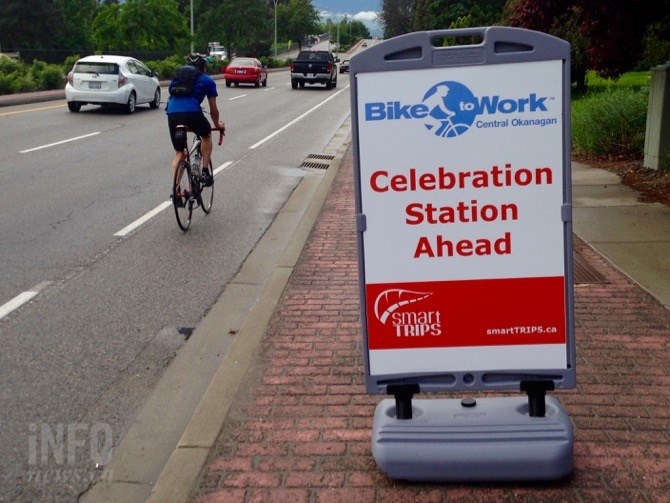
The city is using social marketing techniques to get commuters out of their cars.
(JOHN MCDONALD / iNFOnews.ca)
May 27, 2015 - 7:29 PM
KELOWNA - Forget bike to work week; this is just one of 52 weeks in a larger year-around social engineering campaign to change your mindset on getting from A to B that will hopefully reduce our overall need to engineer new roads and bridges.
And in the Central Okanagan, that's no small task which probably makes the City of Kelowna try that much harder
“It is social marketing-based, taking techniques and strategies from traditional marketing and applying them to social change,” says Mike Kittmer, active transportation coordinator for the City of Kelowna. “You have to market yourself, you have to treat it like a business, treat it like you’re competing with other modes like the automobile.”
The numbers show we love our cars in the Central Okanagan; more than almost anywhere else in the province. Traffic counts released last week by the Ministry of Transportation show that working commuters use cars and trucks 81.6 per cent of the time, a full ten per cent higher than the provincial average of 71.3 per cent.
Transit use is also much lower, with just 3.4 per cent heading for work on a bus versus the provincial average of 12.6 per cent.
There may be good excuses for that. Agricultural roots encouraged sprawl before the term was even invented and it was easier in the past to just develop the valley floor than build houses on the hillsides. The result is now traffic-clogged roads, even after a series of roadways projects worth some $400 million in the last decade up and down the Highway 97 corridor.
“We know the solution is not just more blacktop,” Kittmer says. “Of course, there’s going to be more roadways but if we can reduce the demand through active transportation, then we all benefit through a healthier region, better air quality, more sustainable land use. We’re not creating roads out of land that could be used for other things.”
That’s why Kelowna Transit is vowing to double the number of commuter transit trips to seven per cent in the next 20 years and that’s why the city will literally work one-on-one to help a would-be cyclist or transit-user develop a plan and the confidence to get out of their cars.
“Bike to Work Week is really just the tip of the iceberg,” Kittmer says. “Individualized marketing is certainly a more expensive way to go but it has actually proven to have the best results and we are finding the behaviour changes are staying with them.”
The city is backing all this with the continual development of the type of infrastructure that attracts new commuting cyclists - separated cycling tracks and shared roadways that keep them away from cars.
Ethel Street in Kelowna is scheduled for a $1.7-million redevelopment as an active transportation corridor with cycling tracks on both sides of the road, while Kittmer says plans are in the works to connect the Rail Trail with the Mission Park Greenway with an advanced cycle track that includes protected intersections.
“Our cycling infrastructure is only partially developed where as the road network has been developed over a longer period of time,” he says. “We need to keep investing to the point where the networks are equal and people will have confidence using the system."
To contact the reporter for this story, email John McDonald at jmcdonald@infonews.ca or call 250-808-0143. To contact the editor, email mjones@infonews.ca or call 250-718-2724.0606
News from © iNFOnews, 2015